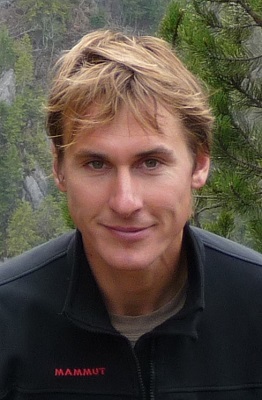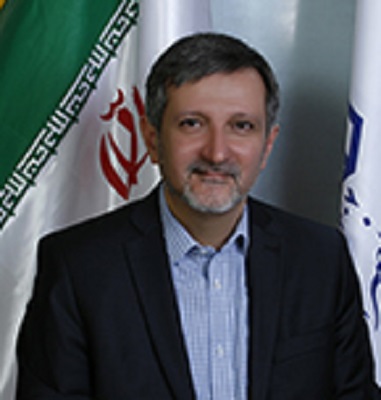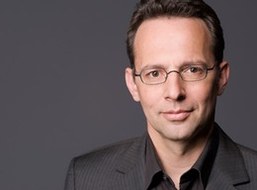Holding annual conferences with the aim of collecting experiences and the latest scientific achievements could be an effective step in the improvement of science. For this purpose, in the ICCIA 2019 experts have been invited so that they could share the latest scientific opportunities and challenges with participants of the conference. Recognizing the newest opportunities in the field of control can widen the perspective of the participants in this field, and with awareness of the current challenges by sharing knowledge of experts, the appropriate platform is created for rapid scientific growth in this area. In this regard, some of the top researchers have been invited to provide the participants with the latest scientific experiences as well as their vision as a key speaker.
 |
Florian Dörfler
Bio: Florian Dörfler is an Associate Professor at the Automatic Control Laboratory at ETH
Zürich. He received his Ph.D. degree in Mechanical Engineering from the
University of California at Santa Barbara in 2013, and a Diplom degree in
Engineering Cybernetics from the University of Stuttgart in 2008. From 2013 to
2014 he was an Assistant Professor at the University of California Los Angeles.
His students were winners or finalists for Best Student Paper awards at the
2019/2013 European Control Conference, the 2016 American Control Conference,
and the 2017 PES PowerTech Conference. His articles received the 2010 ACC
Student Best Paper Award, the 2011 O. Hugo Schuck Best Paper Award, the
2012-2014 Automatica Best Paper Award, and the 2016 IEEE Circuits and Systems
Guillemin-Cauer Best Paper Award. He is a recipient of the 2009 Regents Special
International Fellowship, the 2011 Peter J. Frenkel Foundation Fellowship, and
the 2015 UCSB ME Best PhD award.
|
Title:Data-enabled
predictive control in autonomous energy systems
Abstract: We consider the problem of
optimal and constrained control for unknown systems. A novel data-enabled
predictive control (DeePC) algorithm is presented that computes optimal and
safe control policies using real-time feedback driving the unknown system along
a desired trajectory while satisfying system constraints. Using a finite number
of data samples from the unknown system, our proposed algorithm uses a
behavioral systems theory approach to learn a non-parametric system model used
to predict future trajectories. We show that, in the case of deterministic
linear time-invariant systems, the DeePC algorithm is equivalent to the widely
adopted Model Predictive Control (MPC), but it generally outperforms subsequent
system identification and model-based control. To cope with nonlinear and
stochastic systems, we propose salient regularizations to the DeePC algorithm.
Using techniques from distributionally robust stochastic optimization, we prove
that these regularization indeed robustify DeePC against corrupted data. We
illustrate our results with nonlinear and noisy simulation case studies from
autonomous energy systems as well as aerial robotics.

|
Ali Khaki Sedigh
Bio:
Dr. Ali Khaki-Sedigh is graduated with a B.Sc.
degree in Mathematics from University of Newcastle, England (1983), M.S. degree
in Control System, UMIST, England (1985), and Ph.D. in Control Engineering from
University of Salford, England (1988). He is now a professor in the Department
of Electrical Engineering, K. N. Toosi University of Technology.
He has
been elected as The Outstanding Academic Staff, the title awarded by the
Ministry of Science, Research and Technology (1997-1999), and also as The
outstanding University Researcher (1996-1997), the title awarded by K. N. Toosi
University chancellor. Dr. Khaki-Sedigh has been the President of the K. N.
Toosi University of Technology (2003-2007 and 2011- 2017). He has published 14
books in his major and many of his books has been elected as the book of the
year at universities. He also has published 120 articles in international
journals and 22 Persian research paper, and he has presented 160 articles in
national and international conferences. His research activities include: Robust
and Adaptive Control, predict Control and applications of Controlengineering.
|
Title:
Data-Driven Control
Abstract: Nowadays, with the
development of science and technology, practical processes in chemical
industry, metallurgy, machinery, electronics, electricity, transportation, and logistics
have become more complex. Therefore, modeling processes using first principles
or identification has become more difficult. For this reason, traditional model-based
control (MBC) theory has become impractical for control of this systems. On the
other hand, historical data collected from plants are easily available and can
be used to design successful controllers. Data-driven control (DDC)
systems are a group of methods in which the controller is directly
designed based on the input/output (I/O) data collected from the controlled
systems. Until now, there have been a few DDC methods, but they are characterized
by different names, such as data-driven control, data-based control, modeless
control, MFAC (model-free adaptive control), IFT (iterative feedback tuning),
VRFT (virtual reference feedback tuning), and ILC (iterative learning control).
Sorted according to the type of data usage, DDC methods can be summarized as
three classes: those based on on-line data; those based on off-line data, and
those based on both (hybrid DDC).
Title: The past, present and future of Model Predictive Control
Abstract: During the past decades model predictive control (MPC) has become a preferred control strategy for the control of a large number of industrial control problems fromdistillation control to autonomous driving. Computational issues, application aspects and systems theoretic properties of MPC (like stability and robustness) are rather well understood by now and the theory is well developed even for nonlinear systems. However, during the past couple of years there have been some exciting new trends in MPC that promise to change the field in a lasting way. In this overview presentation we will give an introduction to and an overview over the general field of model predictive control focusing on new trends.
Most prominently one of those trends concerns the control objective to be achieved. In standard MPC formulations, the considered control objective is typically the stabilization of some (given) setpoint or trajectory to be tracked. In contrast, the main focus in so-called "economic MPC" is on closed-loop performance where the cost to be optimized is directly related to some economic objective. This shift in the typical control task to be solved is especially of interest for many industrial applications like robot control, autonomous mobility, or industrial production processes in the framework of Industry 4.0, and will be discussed in the talk.
Secondly, interesting new results for "distributed economic model predictive control" for the control of networks of systems have been developed recently and will be presented in the talk.
And, thirdly, the new possibilities arising from data science and learning have also led to exciting new developments in MPC that will also be briefly addressed in this presentation.

|
Leon Urbas (IEEE Member, Namur, VDI GMA, VDI/GVC ProcessNet) is a computational engineering scientist by training and earned his doctorate in process systems engineering for research on operator training systems at TU Berlin. Several years of work experience in process optimization and automation in the process industries and basic research on Human-Machine Interaction laid the foundations for the research of his group at TU Dresden on the key elements of digital transformation in the process industry: semantic information models of process systems engineering and process automation within a process-product-resource framework and their application in accelerated engineering methods and work flows in modular plants. This applied research provides directions for the group’s basic research on the design of human-technology co-creation and collaboration in cyber-physical production systems.
At TU Dresden he is Dean of Studies for Information Systems Engineering, board member of the Process-to-Order Lab and spokesperson of the DFG research training group Conducive Design of Cyber-Physical Production Systems. He is member of the advisory board of the ProcessNet Process and Plant Engineering Division and spokesperson of the VDI/VDE GMA 5.16 Task Force on Future Automation Architectures.
|
Title: Optimizing Performance vs Data Privacy in Value Networks
Abstract: Closing control loops in value creation networks across different processes and companies is a promising aspect of digitization for robust circular flow economies. Open interfaces, modular automation architectures and new methods for the design of distributed controls offer the possibility to implement such applications. However, this requires the disclosure of process-related real-time information within the value network, which may include partners with different levels of trust.
The lecture gives 1) an overview of current methods for privacy protection and 2) reports on current research on the opportunities and risks of information disclosure in value networks.